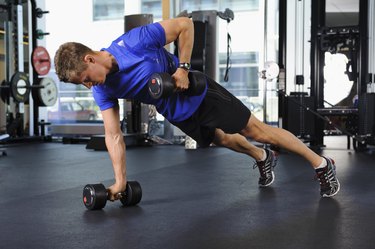
Even though men may have an advantage over women when it comes to burning fat thanks to hormonal and muscle mass differences, that doesn't mean it's easy. At its most basic level, losing body fat requires that you burn more calories than you consume every day.
You do this by cleaning up your diet and incorporating both weight-training sessions and cardiovascular exercise (specifically HIIT) into your weekly workout routine.
Video of the Day
Video of the Day
Step 1: Lift Weights Three Days a Week
Lifting weights on a regular basis increases your muscle mass, which helps boosts your metabolism and ultimately, burn more fat. So if you're a beginner, you might follow this sample schedule: On Mondays, Wednesdays and Fridays, pick six exercises (see below for examples) and complete three sets of eight to 12 reps:
- Chest press
- Military press
- Bent-over row
- Upright rows
- Biceps curls
- Triceps kickback
- Squat
- Deadlift
- Calf raise
- Crunches
Allow your muscle groups about a minute in between sets and exercises to adequately recover. And don't train the same muscle group on two consecutive days.
Warning
When weight training, be sure to lift an appropriate amount of weight. Don't try to lift more than you can comfortably control in an attempt to maximize your workouts.
Choose a weight that allows you to complete eight to 12 reps and use a spotter for any exercises that require you to hold the weight over your head or face (overhead squat, bench press, etc.).
Read more: The Best Strength-Training Exercises for Weight Loss
Step 2: Don't Skimp on Cardio
Aim to do cardiovascular workouts three days per week as well. So perhaps on Tuesdays, Thursdays and Saturdays, you complete 30 to 60 minutes of your favorite type of cardio:
- Running
- Cycling
- Rowing
- Elliptical
- Stepmill
- Swimming
- Walking
Running is one of the most efficient exercise in terms of burning the most calories, but choose activities that you enjoy so that you'll be consistent with your workouts. Whatever form you choose, be sure to incorporate high-intensity intervals to take advantage of "the afterburn effect."
Alternating between max-effort work and rest periods puts more demand on the energy systems of your body, forcing it to work to refuel and repair (read: burn calories) even after your workout has ended. Not to mention, HIIT maximizes your calorie burn in about half the time of steady-state cardio, according to a December 2017 study published in Biology of Sport.
Read more: The 5 Best High-Intensity Exercises for Weight Loss
Step 3: Watch What You Eat
If fat loss is your goal, you need to make healthy food and drink choices. Limit or cut out soda and alcohol and stay away from fast foods and anything fried or highly processed.
It's very easy to cancel out the calories you've burned from exercise in a single high-fat, high-calorie meal, so set yourself up for success by eating lots of fresh vegetables and fruits, lean protein like chicken and turkey, healthy fats like avocado and olive oil and whole grains.
Read more: 10 Surprising Flat-Belly Foods
Step 4: Track Your Progress
Keeping tabs on your fat loss will help motivate you to keep going (or let you know if you need to double down on your efforts). Use a tape measure to get the diameter of your waist at belly-button level and write it down so you can monitor your progress. Although you may gain a few pounds with weight training, your body will become leaner because of the decrease in body fat.
After eight weeks, use the tape measure to re-measure the diameter of your waist. Write down your new waist size and note any progress. With healthy eating habits and consistent cardiovascular and weight training, you should see a decrease in waist size, signifying a decrease in body-fat percentage.
Was this article helpful?
150 Characters Max
0/150
Thank you for sharing!
Thank you for your feedback!